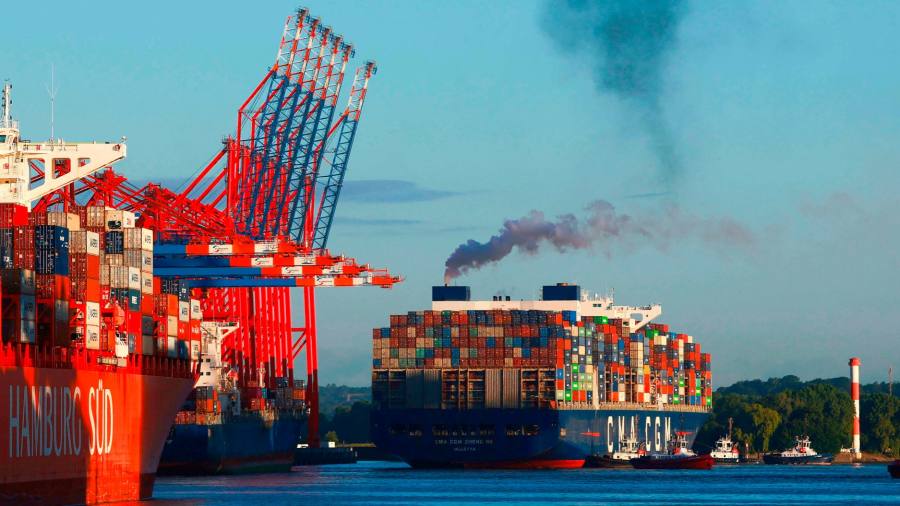Receive free Climate change updates
We’ll send you a myFT Daily Digest email rounding up the latest Climate change news every morning.
Shipping is a longtime climate laggard. Vessels that criss-cross the globe are hard to integrate into an emission reduction architecture that relies on individual countries committing to agreed targets. Though shipping emits almost 3 per cent of global greenhouse gases, alternatives to highly polluting bunker fuel are expensive or not fully developed. The industry is poised to make a belated commitment to align itself more closely with international ambitions to limit global warming to 1.5C above pre-industrial levels. But China has been rallying poorer countries to oppose what may be a vital measure to meet the industry’s new targets: a global levy on shipping emissions.
The UN’s International Maritime Organization, which regulates shipping, has previously committed only to halve the industry’s greenhouse gas emissions by 2050 from 2008 levels. After a week of secretive talks, a key IMO committee is on Friday expected to agree broadly to net zero emissions by around 2050. But a strategy must still be thrashed out to achieve it.
One element must be a mandate for vessels to switch to zero-carbon fuels, mirroring those being adopted, for example, for automobiles. Putting a price on carbon emissions should also be central. While the EU is already planning to introduce shipping into its emissions trading scheme — in which shipowners travelling through European waters will pay a financial cost for their pollution — a global initiative would be far more effective.
A levy would create a more powerful incentive for shipping companies to invest in vessels using zero-carbon fuels. Since the commercial life of vessels can be 20 to 30 years, that shift needs to begin now. A levy could also raise sizeable revenues which could help fund development of new fuel technologies such as green hydrogen or ammonia and the transformation of shipping and port infrastructure.
The World Bank estimated last month a levy on international shipping could raise an annual average of $40bn to $60bn between 2025 and 2050. As well as being reinvested into maritime transport, it suggested some should go to developing countries to aid their green transition. Some countries propose putting revenues towards compensating vulnerable countries for “loss and damage” caused by climate change. But efforts by France’s Emmanuel Macron to rally delegates around a levy at a Paris summit last month fell short of diplomats’ hopes.
China has been urging poorer countries to oppose a flat levy, as well as stronger decarbonising targets, arguing these could impede the global recovery by raising supply chain costs. It is not alone; Brazil and Argentina fear a levy would increase the cost of exporting their commodities. Revenues could, however, support countries in decarbonising shipping and in any case a levy would take at least a few years to implement. The long-term climate costs of not reducing emissions would of course be greater. Indeed, a levy is backed by some poorer countries highly exposed to rising sea levels, such as the Marshall Islands, which is also home to one of the world’s largest ship registries.
China has a history of cloaking its own interests — it has a large state-owned shipping industry — in concern for developing countries, where its Belt and Road Initiative gives it considerable sway. Those involved in this week’s IMO talks, though, said they had seen a stark geopolitical split between developed and developing countries.
Richer countries that support a shipping emissions levy need to do more to make the case. Properly designed, the measure could provide significant funds to modernise shipping, including in emerging markets, as well as ensuring an equitable transition. And it could be key to accelerating decarbonising efforts in a genuinely global sector that has so far proved resistant.
Read the full article here




